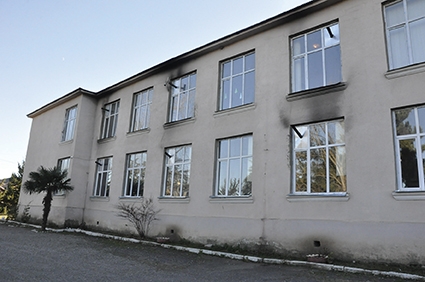Karajala Village School Bans Hijabs
Although there is a public school in our village, I have to send my 12-year-old daughter Arzu to another school. Anyone can enjoy his constitutional right but we are deprived of that right. Our school director Elza Shurova does not allow school-girls to wear hijab at school – said Mako Ramazanov, resident of Karajala village, Telavi municipality. “We are a religious family; my daughter is a believer, too. Ashurova bans her and other girls from wearing hijab at school. The Constitution of Georgia allows them to wear hijab but the school director does not.”
Like Arzu Razmanova, 10 more girls from Karajala village go to public school in Telavi.
“I cannot send my daughter to Telavi public school. When we have a public school in the village, why should I send my children to other schools? If the State does not ban the wearing of hijab, why should a school director prohibit it?” asked Maharram Osmanov.
Karajala public school director Elza Ashurova does not deny the accusations and insists the school-girls shall not wear hijab at school.
“I know that the Constitution of Georgia does not prohibit them wearing hijab but for me, as a school director, there are more important values than the Constitution. We work to defend these values. What's so bad about it? The school and mosque have different roles; we must not mix them,” Ashurova said.
Head of the Public Relations Department at the Ministry of Education and Science of Georgia Nata Asatiani mentioned the Law on General Education and stated that in accordance with Article 13 of the Law, discrimination is inadmissible. “Under the law, the school guarantees the individual and collective rights of minority members on the basis of equality; they have a right to speak their mother tongue and maintain and demonstrate their cultural background.”
Asatiani noted that the school administration also has the right to work out internal school regulations.
“According to Article 14 Paragraph 6 of the Law on General Education, the school has the right to introduce school uniforms for pupils. However, the same paragraph states that the freedom of expression of either pupil or a teacher must not be violated by the introduction of uniforms. At the same time, a pupil and a teacher can refuse to wear the school uniform,” Asatiani said.
Education expert Shalva Tabatadze said the exceptions regulated by the law are very important and the discrimination is inadmissible.
“The law guarantees secularity of the school and religious minorities shall not be discriminated against. Of course, the school administration has right to elaborate internal regulations but they must be adherent to the law.”
12-year-old Arzu Ramazanova hopes she, together with her friends, will be able to go to her village school from next year. “I want to study at school. Telavi school is very far away and it’s difficult to get there, particularly in winter. I know all children in my village and I want to study in Karajala village together with them.”
The article was prepared in the frame of a project implemented by Human Rights House Tbilisi with financial support of the Embassy of the Kingdom of the Netherlands in Georgia. HRHT bears sole responsibility for the content of the article.
The article does not necessarily reflect the views of the donor.
Tural Gurbanli












